The next day John again was standing with two of his disciples, and as he watched Jesus walk by, he exclaimed, ‘Look, here is the Lamb of God!’ The two disciples heard him say this, and they followed Jesus. When Jesus turned and saw them following, he said to them, ‘What are you looking for?’ They said to him, ‘Rabbi’ (which translated means Teacher), ‘where are you staying?’ He said to them, ‘Come and see.’ They came and saw where he was staying, and they remained with him that day. It was about four o’clock in the afternoon. One of the two who heard John speak and followed him was Andrew, Simon Peter’s brother. He first found his brother Simon and said to him, ‘We have found the Messiah’ (which is translated Anointed). He brought Simon to Jesus, who looked at him and said, ‘You are Simon son of John. You are to be called Cephas’ (which is translated Peter). 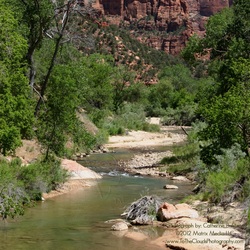 Why did these men decide to follow Jesus? It seems so sudden. One day they were John's disciples; the next day they were Jesus' disciples. It seems sudden except they were clearly looking or waiting or searching for the Messiah. Andrew says to his brother, "We found the Messiah." Messiah - the anointed one. Two other times in the Hebrew scriptures we find the term Messiah applied. David was the Messiah. King Cyrus was the Messiah. And again, the people of Israel are looking for the Messiah. The anointed one. Andrew and an unnamed disciple of John leave John and follow Jesus. Why didn't John follow too? Or maybe he did and he's wrapped in the "they." Andrew and the unnamed one, Peter and then Philip and then Nathanael. They were all on alert for the Messiah and upon hearing he is found, they responded to the words, "Come and see." Come where? See what? We who have read beyond this passage can say they were in for a life-altering, mind-blowing, bumpy, rough, exhilarating journey with this Anointed One. I'll be honest, I read and enjoyed Zealot: The Life and Times of Jesus of Nazareth  Wonderful resource for anointing oil. Click and See. Wonderful resource for anointing oil. Click and See. I guess I have more questions than answers at this point of this gospel. As it should be. We're only at the beginning after all. And if I am to do any justice in preaching it or teaching it or following its strand through this narrative lectionary, I want to stay in this chapter. I don't want to read chapter 19 into chapter 1. That's not how we read a book. (Unless you're the type of person who reads the last page... just in case.) The creative force of the universe has come to earth, wrapped itself in the flesh of a human named Jesus. A distant cousin was looking for the Anointed On, waiting for God to once again wrap an anointing around a human. The etymology of the English word "anoint" comes from the verb to smear on. It makes me smile a bit thinking of Jesus as a human with God smeared on him. The smear of the Spirit soaking into the fiber of his being, claiming him in a unique way, for a unique purpose. I've found the one who is smeared with God. Are you the one who is smeared with God? And Jesus says, "Come and see." You know what... when I put it that way, I'm in. I want to see what God is up to.
0 Comments
This is the testimony given by John when the Jews sent priests and Levites from Jerusalem to ask him, ‘Who are you?’ He confessed and did not deny it, but confessed, ‘I am not the Messiah.’ And they asked him, ‘What then? Are you Elijah?’ He said, ‘I am not.’ ‘Are you the prophet?’ He answered, ‘No.’ Then they said to him, ‘Who are you? Let us have an answer for those who sent us. What do you say about yourself?’ He said, 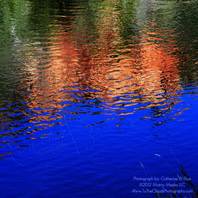 John in John's gospel is not the locust eating, wilderness dweller spoken of by the other gospel writers. John is most simply - the witness. He is the voice, he says. He testifies to the light. Testify - as in a court of law. Testify - as one does of one's conversion experience. Testify - as a witness gives proof or evidence. In John's gospel there is no narration of Jesus' baptism. There is no cousin to cousin encounter teased out for us to see Jesus entering the water or to imagine John taking Jesus' hand to baptize him. No, in John's gospel there is only John's testimony to what happened. "I saw the Spirit descending from heaven like a dove and it remained on him." I grew up in a "testimony" culture. I was bred a Bapticostal, a mix of American Baptist and Assembly of God. The first time I learned about testimonies, I was taught there three simple steps: who I was before I met Jesus, what happenstance brought Jesus into my life, and what change has Jesus brought to my life. It's interesting to note that John's testimony has three components to as well: who John believes Jesus is, how John came to recognize who Jesus was, and a statement of witness to who Jesus is. There is for sure a little bit of John's discovery process in this testimony but the bulk of his testimony is about Jesus. Jesus is the Lamb of God who takes away the sins of the world. I would not have recognized it had I not been told about the dove that would come from heaven. And the dove did come from heaven - so again I say - this is the Son of God. 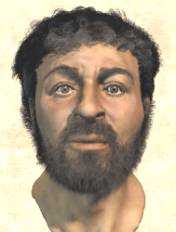 The second time I learned about giving testimonies, I was taught that a testimony shouldn't be more than week old. In other words, what I know or have experienced of God's movement in my life should be "fresh." God is always doing something and I should always be on the lookout for what God is doing - and then of course always ready to testify to what I have seen. Here is a forensic drawing of what Jesus' face may have looked like. Forensic science would say that the most recent memory would produce the best forensic drawing or the best testimony. Certainly laying claim to what happened to me when I was 14 that resulted in me recognizing who Jesus was is an old memory at this point. And the Jesus I knew when I was 14 is not the same Jesus I know today. For example, the Jesus I understood at 14 was primarily interested in taking away my sin, my individual sin. But the Jesus that John speaks of and the one I am more familiar with at this time in my life speaks of the Lamb of God who takes away the sin of the world. The cosmic, global separation that we may feel is not a reality. Jesus reveals God to us. Just as the writer indicated in the earlier verses, no one has ever seen God. But Jesus has revealed God to us. For me, the Greek poem at the beginning of the book transitions with this portion about John the Baptist and it sets the stage for us to consider how God is revealed. A testimony is all about revelation. And in our 21st century sensibilities, we often shy away from testifying to the light. After all, can we really say for sure that God has done something, is doing something? Don't statements like that set us apart as some holier than thou persona? Why would people believe that we know something about God that maybe they don't? This journey of revelation in the Book of John begins with one's personal testimony. I typically use the New Revised Standard Version for these reflections but I found the Common English Version to be simply fascinating. Enjoy a fresh perspective on this well known poem. In the beginning was the Word  Full disclosure - I'm a gospel of John fan. I read this translation and I'm almost giddy with delight. 10 The light was in the world, and the world came into being through the light, but the world didn’t recognize the light. Translation note - This verse isn't typically translated this way. It's translated "He was in the world and the world came into being through him and the world didn't understand him." So, I looked it up and the verse translates like this, "It was in the system and through the system it came and the system didn't know it." What I love about the gospel of John is that the writer(s) is synchronizing traditions throughout - weaving Greek cultural with Judaism. The writer is faced with a mixed marriage of sorts - Greek followers of Jesus worshiping alongside Jewish followers of Jesus. Their rich cultures are growing on one another and this writer provides the first quilt for us to wrap up with. When we get close enough to it, we see the stitches that hold odd pieces together and we see the strings that are coming undone. For the Greek culture, this is the beginning of their creation myth: In the beginning there was only chaos. Then out of the void appeared Erebus, the unknowable place where death dwells, and Night. All else was empty, silent, endless, darkness. Then somehow Love was born bringing a start of order. From Love came Light and Day. Once there was Light and Day, Gaea, the earth appeared. For the Jewish culture, this is the beginning to their creation myth: In the beginning when God created the heavens and the earth, the earth was a formless void and darkness covered the face of the deep, while a wind from God swept over the face of the waters. Then God said, ‘Let there be light’; and there was light. And God saw that the light was good; and God separated the light from the darkness. God called the light Day, and the darkness he called Night.  And the writer of John's gospel says: In the beginning was the word - the logos in Greek, the dabar in Hebrew, the creative force of the universe. And this creative force was with God, it was God, it was with God in the beginning. What came into being through this creative force was light and that life was light to all people. The light shines on all people. The world, the system, the cosmos came into being through this light and the light shines in the darkness and the darkness does not extinguish it. For so many, the idea of God as a person, specifically a man in the sky is no longer a viable option. Our world doesn't make sense with that kind of myth. And by our world, I mean a Western 21st century worldview. Post industrial revolution. Driven by capitalism. Connected by the internet but disconnected with one another. Filled with injustice and inequality. An ethnically diverse world, where we mingle our cultures and explore our cuisines. What kind of myth speaks to this culture? John offers us "A system with light and life." The light and the life comes into the system and the system doesn't recognize it. The light and the life seems foreign to the darkness that is pervasive. And John equates this very human person, the Palestinian Jew named Jesus with the light and life that comes into a system and the system doesn't recognize it. Both the Greek folks and Jewish folks in this community of faith would've been intrigued and offended by this quilt that John has stitched together. For the Greeks - a human with skin and bones and snot and tears cannot possibly be equated with the light and life of the creative order. The cosmic implications will be ruined by the humanity of it. For the Jew - the God of Abraham who called things into existence cannot be defined as the life and the light of the Greek creation myth. God is a person. Jesus is a person. The personal implications will be ruined by the cosmic picture. Yes. Both myths bastardized for the purpose of creating a quilt that we in the 21st century have been wrapping ourselves up in for so long it is showing signs of both wear and love. We wrap ourselves around the idea that the light was in the world and the world, even we, came into being through this light. But we still live in a world where the light still seems foreign. Ho, everyone who thirsts, 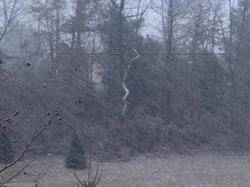 I woke this morning to news that a large portion of the schools in the area were closed because of snow. But there was no snow... yet. My facebook page was filled with status updates that read, "When I was in school there had to be actual snow in order to have a snow day." Impending snow. And as I poured my second cup of coffee I wondered what would happen if it didn't snow. What would the administrators do/think about that? And somewhere along my trek from the kitchen back to my sofa and blanket, it began to snow. 8am. 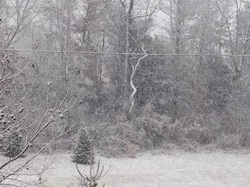 At 8:20am, it looked like this. It didn't happen like that for Isaiah. The word of the Lord didn't return fulfilled in a 20 minute turnaround. The prediction of God's purposes working together stayed a prediction... or did it? It's midway through Advent that I struggle to hold onto the meaning of Christmas. 2000 years after Jesus' birth, I wonder what new birth are we looking for - again and again. I wish for a sense of longing while I sit in my warm home with my second cup of coffee. I want to feel the longing of those who predicted fulfillment, who believed in shalom. I wish to know the third writer of Isaiah. Was he (presumably he) a person of great faith? In what ways did he cherish the tradition passed down to him? Was he distracted at times by the daily routine of his world? What made him see the coming of God or the presence of God as a real thing to want? And what gave him the courage to say it aloud? How do I, midway into December on Advent 3, come closer to the felt reality of Isaiah and his prediction of an everlasting covenant, of seeking God and finding God, of God's purposes being fulfilled? An article by Deacon Greg Kandra about the "war on Christmas" might be helping. The real war on Christmas is the number of people who will go without food and adequate housing. The real war on Christmas is the teenage girl who has been thrown out on the street by her parents because she is pregnant. The real war on Christmas is the stranger that will not be welcome just because he looks different than the rest of us. The real war on Christmas is the fact that most Churches will be virtually empty on Christmas Eve and Christmas Day yet the retail outlets will be jam packed. The real war on Christmas is that we choose to focus on the nonsense while our Christian brothers and sisters around the world are being killed for no other reason than they are Christian and we stand by and do nothing! That is the real war on Christmas. 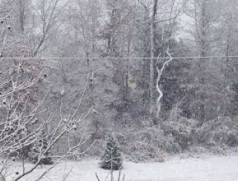 For those things, I long for fulfillment of God's purposes. I hope for and wish for God's presence to rain down. And like Isaiah, I've seen the sky open up and water the earth. I will draw faith from what I have seen as I believe for what I want to see. This image taken at 8:30am. The hand of the Lord came upon me, and he brought me out by the spirit of the Lord and set me down in the middle of a valley; it was full of bones. He led me all round them; there were very many lying in the valley, and they were very dry. He said to me, ‘Mortal, can these bones live?’ I answered, ‘O Lord God, you know.’ Then he said to me, ‘Prophesy to these bones, and say to them: O dry bones, hear the word of the Lord. Thus says the Lord God to these bones: I will cause breath to enter you, and you shall live. I will lay sinews on you, and will cause flesh to come upon you, and cover you with skin, and put breath in you, and you shall live; and you shall know that I am the Lord.’ So I prophesied as I had been commanded; and as I prophesied, suddenly there was a noise, a rattling, and the bones came together, bone to its bone. I looked, and there were sinews on them, and flesh had come upon them, and skin had covered them; but there was no breath in them. Then he said to me, ‘Prophesy to the breath, prophesy, mortal, and say to the breath: Thus says the Lord God: Come from the four winds, O breath, and breathe upon these slain, that they may live.’ I prophesied as he commanded me, and the breath came into them, and they lived, and stood on their feet, a vast multitude. 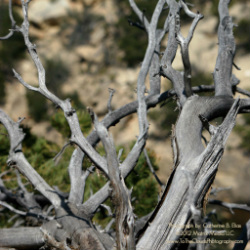 Who is dried up? What has been cast aside, believed to be ruined? Where do we see piles of death? When did the breath leave? Why - How does prophecy work? Bone to bone, sinew and flesh, breath. I try to imagine the multitude of dry bones rattling to find one another. The bones of those who have gone before us? Or are they bones of those who we have called ruined, prophesied as ruined? The young urban man whose family is a gang. The single mother with two jobs and two kids and two twenty dollar bills left at the end of the month. The middle aged man riddled with Parkinson's. The elderly woman with Alzheimer's. The young woman who cuts herself to feel the pain of her life. The lonely, the aged, the unemployed, the sick, the despairing, the addicted, the bones of the dried up. Imagine these dried up, cast away piles of death rattling to find one another. Suddenly I want to be part of the pile. I want my own dryness to count so that I can find one another. I want to be put together too. Sinews coming from the prophecy - you connect to you. You help move that one. that one holds onto to this one. This one strengthen the other one. The word continues, the life giving prophetic word - speaking wholeness, completeness, healing, shalom. Peace. The word of Ezekiel brings true peace to this multitude. Sinews tie the multitude together. As if coming across new friends, loved ones, those whom we have forgotten. Or others. strangers, aliens, exiles, foreigners - and yet we are connected by this fibrous tissues.  And as the multitude settles into this new connected body, flesh wraps around them. Our organic natural shield, protective layer. Miraculously regenerative. Waterproof. Amazingly resilient yet stunningly fragile. The bones, connected and wrapped together but still one thing is needed. The breath. The Spirit. The wind of God. Can you hear it? Can you feel it? Do you perceive it? Prophecy to the bones. They say they are dried up. That is not God's vision. Who is dried up? What has been cast aside, believed to be ruined? Where do we see piles of death? When did the breath leave? Why - How does prophecy work? |
Search this blog for a specific text or story:
I am grateful for
|

This work is licensed under a Creative Commons Attribution-NonCommercial-ShareAlike 3.0 Unported License.
